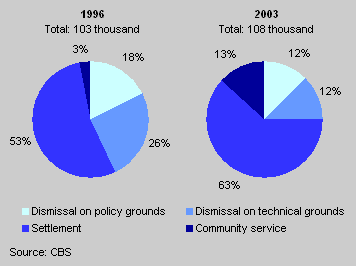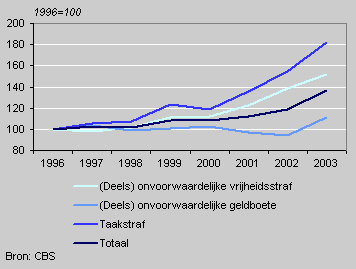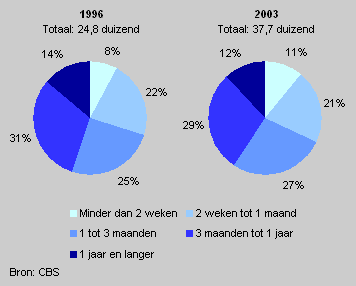More sentences, but not stricter

More, but not stricter. This sums up the development of the outcome of Dutch court cases discontinued by public prosecutors and sentences imposed by judges in the period 1996-2003.
Settlement and discontinuance by public prosecutors (percentages)

More community service
In 2003 public prosecutors in the Netherlands discontinued prosecution in just over 108 thousand cases. Six out of ten of these discontinued cases were settled by means of a monetary order. The other three categories of discontinuance (dismissal on technical grounds, dismissal on policy grounds and community service) each accounted for a similar proportion of discontinued cases: just over 12 percent.
In the course of the period 1996-2003 the public prosecutor discontinued 5 percent more cases. Dismissals on technical and policy grounds decreased by 25 and 48 percent respectively to 13 thousand each. The number of defendants ordered to perform to community service increased fourfold in the same period, to 14 thousand. This means that public prosecutors did not impose stricter penalties, but rather that they approached and treated these cases more seriously.
Sentences by judges (1996 = 100)

Court sentences
Judges in Dutch courts imposed nearly 123 thousand sentences on defendants found guilty in 2003; 32 percent received a custodial sentence, 42 percent were ordered to pay a fine and 26 percent were ordered to perform community service.
In the period 1996-2003 more prison sentences and fines were imposed, 52 and 82 percent respectively. This reflects the increasingly important role of community service as a penalty, which is also the case for community service penalties imposed by public prosecutors. This form of punishment can be put into effect quickly and does not take up prison cell capacity.
Duration of (partly) unconditional custodial sentence imposed by judges (1996 = 100)

Duration of custodial sentences
Judges pronounced unconditional and partly unconditional custodial sentences of up to one month in one third of cases in 2003.
One in eight guilty defendants received custodial sentences of one year or longer.
The number of unconditional and partly unconditional sentences rose by 52 percent in the period 1996-2003. The number of short sentences (up to two weeks) more than doubled and sentences of two weeks to one month and from one to three months rose by 47 and 63 percent respectively. Custodial sentences lasting one year or longer rose by 27 percent . It may be concluded from these developments that judges were confronted with perpetrators of less serious crimes in this period.
Frits Huls